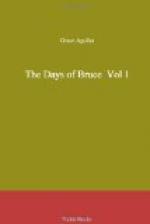“And I have interest,” answered the boy, fervently; “the interest of gratitude, and faithfulness, and love. An orphan, miserably an orphan—alone upon the wide earth—he hath protected, cherished, aye, and honored me with his confidence and love. He tended me in sorrow, and I would pour back into his noble heart all the love, the devotion he hath excited in mine. Little can I do, alas! naught but love and serve; yet, yet, I know he would not reject even this—he would let me love him still!”
“Grant the poor boy his boon,” whispered Lancaster, hurriedly; “of a truth he moveth even me.”
“Thine heart is of right true mettle, my child,” said his colleague, even tenderly. “Yet bethink thee all thou must endure if I grant thy boon; not while with me, for there would be a foul blot upon my escutcheon did so noble a knight as Sir Nigel Bruce receive aught save respect and honor at my hands. But in this business I am but a tool, an agent; when once within the boundaries of Edward’s court, Sir Nigel is no longer my prisoner; I must resign him to my sovereign; and then, I dare not give thee hope of gentle treatment either for thyself or him.”
“I will brave it,” answered the boy, calmly; “danger, aye, death in his service, were preferable to my personal liberty, with the torture of the thought upon me, that I shrunk from his side when fidelity and love were most needed.”
“But that very faithfulness, that very love, my child, will make thy fate the harder; the scaffold and the axe, if not the cord,” he added, in a low, stifled tone, “I fear me, will be his doom, despite his youth, his gallantry—all that would make me save him. Thou turnest pale at the bare mention of such things, how couldst thou bear to witness them?”
“Better than to think of them; to sit me down in idle safety and feel that he hath gone forth to this horrible doom, and I have done naught to soothe and tend him on his way,” replied the boy, firmly, though his very lip blanched at Hereford’s words. “But must these things be? Is Edward so inexorable?”
“Aye, unto all who thwart him now,” said the earl; “there is no hope for any of the race of Bruce. Be advised, then, gentle boy, retain thy freedom while thou mayest.”
“No, no!” he answered, passionately, “Oh, do not seek to fright me from my purpose; do not think aught of me, save but to grant my boon, and oh, I will bless thee, pray for thee to my dying hour! thou wilt, I know thou wilt.”
“I were no father could I refuse thee, my poor child,” he replied, with earnest tenderness. “Alas! I fear me thou hast asked but increase of misery, yet be it as thou list. And yet,” he added, after a brief pause, during which the boy had sprung from his knee, with an inarticulate cry of joy, and flung himself into the minstrel’s arms, “Sir Nigel hath resolutely refused the attendance of any of his former followers, who would willingly have attended him to England. Hast thou so much influence, thinkest thou, to change his purpose in thy favor?”




